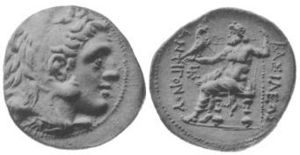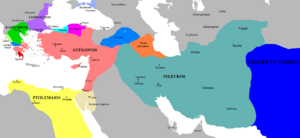Antigonus I Monophthalmus facts for kids
Quick facts for kids Antigonus I Monophthalmus |
|
|---|---|
| Basileus | |

Coin of Antigonus, the Greek inscription reads "ΒΑΣΙΛΕΩΣ ΑΝΤΙΓΟΝΟΥ" meaning [coin] of King Antigonus
|
|
| Basileus of the Antigonid Empire | |
| Reign | 306–301 BC |
| Coronation | 306 BC, Antigonia. |
| Predecessor | Alexander IV |
| Successor | Demetrius I |
| Born | 382 BC Elimeia, Kingdom of Macedon (modern-day Kozani, Greece) |
| Died | 301 BC (aged 80–81) Ipsus, Phrygia (modern-day Çayırbağ, Afyonkarahisar, Turkey) |
| Consort | Stratonice |
| Issue |
|
| Dynasty | Antigonid dynasty |
| Father | Philip (the son of Machatas?) |
Antigonus I Monophthalmus (meaning 'the One-Eyed') was a powerful Macedonian Greek nobleman, general, and king. He was born in 382 BC and died in 301 BC.
Antigonus was a key figure in the history of ancient Macedonia. He served under two famous kings: Philip II and his son, Alexander. After Alexander's death in 323 BC, his huge empire was divided among his generals, known as the Diadochi. Antigonus became one of the most important of these generals. In 306 BC, he declared himself king and started the Antigonid dynasty, a family that would rule parts of Alexander's former empire for many years.
| Top - 0-9 A B C D E F G H I J K L M N O P Q R S T U V W X Y Z |
Early Life and Military Service
We don't know much about Antigonus's early life. He was a nobleman and was likely an important leader in the Macedonian army. He was about the same age as King Philip II.
One story says that Antigonus lost an eye during the Siege of Perinthus in 340 BC. He was hit by a catapult bolt, which is how he got his nickname, 'the One-Eyed'. His importance was clear because he was friends with other top generals like Antipater and Eumenes.
Governor of Phrygia
In 334 BC, Antigonus was a commander in Alexander the Great's army when they invaded the Persian Empire. Alexander trusted Antigonus to protect his supply lines.
Antigonus was made the governor, or satrap, of Phrygia, a region in what is now Turkey. His main job was to keep Alexander's supply routes safe while Alexander marched further east. He fought against Persian forces who tried to cut off Alexander's supplies and won three important battles. This helped Alexander continue his conquests.
After Alexander's Death
When Alexander the Great died in 323 BC, his empire was split among his generals. Antigonus kept control of Phrygia and other nearby regions. However, he soon had problems with Perdiccas, who was the regent (a temporary ruler) of the empire.
Antigonus refused to help another general, Eumenes, take control of his assigned provinces. Perdiccas saw this as a challenge to his power. Antigonus and his son, Demetrius, fled to Greece. There, they joined forces with other powerful generals like Antipater and Ptolemy (who would later rule Egypt).
This led to the First War of the Diadochi. In 320 BC, Perdiccas was killed while trying to invade Egypt.
Becoming a Powerful General
After Perdiccas's death, the generals met again to divide the empire at a meeting called Triparadisus. Antipater became the new regent, and Antigonus was put in charge of all military forces in Asia. He was given the task of defeating the generals who had supported Perdiccas.
Antigonus quickly showed his skill as a military leader. He defeated Eumenes at the Battle of Orkynia, forcing him to hide in a fortress. Then, in the same year, he surprised and defeated other generals at the Battle of Cretopolis. These victories made Antigonus the most powerful general in Asia.
The Second Diadochi War
In 319 BC, Antipater died and named Polyperchon as the new regent, not his own son, Cassander. Antigonus and other generals refused to accept Polyperchon.
Antigonus tried to make a deal with Eumenes, but Eumenes sided with Polyperchon. Eumenes gathered an army and moved into Cilicia, Syria, and Phoenicia. Antigonus was busy fighting another general, Cleitus, in northwestern Asia Minor. Antigonus's forces defeated Cleitus in a land and sea battle.
Meanwhile, Eumenes marched his army into Mesopotamia and then towards Susa, a major treasury city. Antigonus followed him. At the Kopratas river, Eumenes surprised Antigonus's army, causing heavy losses. Antigonus then marched north.
The two armies fought an indecisive battle at Paraitakene. Later, in 315 BC, they fought again at the Battle of Gabiene. Eumenes seemed to win the battle, but his soldiers lost their baggage camp, which contained all their treasures and families. To get their belongings back, the soldiers handed Eumenes over to Antigonus.
Antigonus's son, Demetrius, wanted to spare Eumenes, but most of Antigonus's other generals insisted he be executed. So, Eumenes was killed. With Eumenes gone, Antigonus now controlled most of Alexander's Asian territories, from the eastern provinces to Syria and Asia Minor.
The Third Diadochi War
By 314 BC, Antigonus was very powerful. Other generals like Ptolemy, Cassander, and Lysimachus demanded that he give up some of his territories and share his wealth. Antigonus refused, and war broke out again.
Antigonus sent his general, Aristodemus, to Greece to raise an army and ally with Polyperchon against Cassander. He also sent an army to Asia Minor to stop Cassander and Lysimachus. Antigonus himself invaded Phoenicia, which was controlled by Ptolemy, and besieged the city of Tyre. The siege lasted a year.
In 312 BC, Antigonus captured Lydia and Caria. However, Ptolemy attacked from the south and defeated Antigonus's son, Demetrius, at the Battle of Gaza. After this battle, Seleucus, who had been fighting for Ptolemy, returned to Babylon and took control of his old province. This led to the Babylonian War, where Seleucus defeated Antigonus and Demetrius, securing the eastern provinces for himself.
After the Babylonian War (311-309 BC), Antigonus and Seleucus made peace. Antigonus controlled the western parts of the empire (Greece, Asia Minor, Syria, Phoenicia, and northern Mesopotamia), while Seleucus controlled the eastern parts.
The Fourth Diadochi War and Final Battle
The peace didn't last long. Ptolemy and Cassander soon started fighting Antigonus again. Antigonus's son, Demetrius, fought against Cassander in Greece.
In 306 BC, Antigonus's younger son, Philip, died. This was a sad loss for Antigonus.
Later that year, Demetrius won a major naval battle against Ptolemy at the Battle of Salamis in Cyprus. After this victory, Antigonus declared himself king and gave the same title to his son, Demetrius. This meant they were now independent rulers. The other powerful generals, Cassander, Ptolemy, Lysimachus, and Seleucus, soon followed and also declared themselves kings.
Antigonus then tried to invade Egypt, but Ptolemy's defenses were too strong, and Antigonus had to retreat.
In 305 BC, Demetrius tried to capture the island of Rhodes, which had refused to help Antigonus. The siege lasted a year. Demetrius couldn't capture the city, so he made a peace treaty. The Rhodians agreed to build ships for Antigonus but would not fight against Ptolemy, whom they called "Soter" (savior) for his help during the siege.
The other kings — Cassander, Seleucus, Ptolemy, and Lysimachus — formed an alliance against Antigonus. They attacked him from different directions. Lysimachus invaded Asia Minor from Thrace. Seleucus marched through Mesopotamia and Cappadocia. Antigonus had to call Demetrius back from Greece to help.
The armies of Antigonus and Demetrius met the combined forces of Seleucus, Lysimachus, and Prepelaos at the Battle of Ipsus in 301 BC. This was a very important battle. Antigonus, who was 80 years old, was killed in the battle by a javelin. Before Ipsus, he had never lost a battle.
With Antigonus's death, the dream of reuniting Alexander's empire ended. His kingdom was divided among the victors. Lysimachus and Seleucus took most of his lands. The kings now ruled their own separate kingdoms.
Antigonus's surviving son, Demetrius, later gained control of Macedonia in 294 BC. Antigonus's family, the Antigonid dynasty, ruled Macedonia on and off until the Roman Republic conquered it in 168 BC.
Family Life
Antigonus's father was a nobleman named Philip. His mother's name is not known. He had an older brother named Demetrius and a younger brother named Polemaeus. He also had a younger half-brother named Marsyas.
Antigonus married Stratonice, who was his older brother's widow. They had two sons: Demetrius I Poliorcetes and Philip.
Appearance
Antigonus was a very large man, even taller than his son Demetrius, who was also described as having a "heroic stature." He was also known for being 'the One-Eyed' because he had lost an eye in battle, possibly during the Siege of Perinthus. This made him look even more impressive and formidable.
Antigonus in Stories
Antigonus has appeared in several historical novels and films:
- In Mary Renault's novel Funeral Games, he is called "One Eye".
- In the 2004 film Alexander, he is played by Ian Beattie.
- He appears in L. Sprague de Camp's novels An Elephant for Aristotle and The Bronze God of Rhodes.
- He is a main character in Christian Cameron's novel A Force of Kings.
- He appears in Alfred Duggan's novel Elephants and Castles (also called Besieger of Cities).
- He is a supporting character in Eric Flint's novels The Alexander Inheritance and The Macedonian Hazard.
See also
 In Spanish: Antígono I Monóftalmos para niños
In Spanish: Antígono I Monóftalmos para niños


